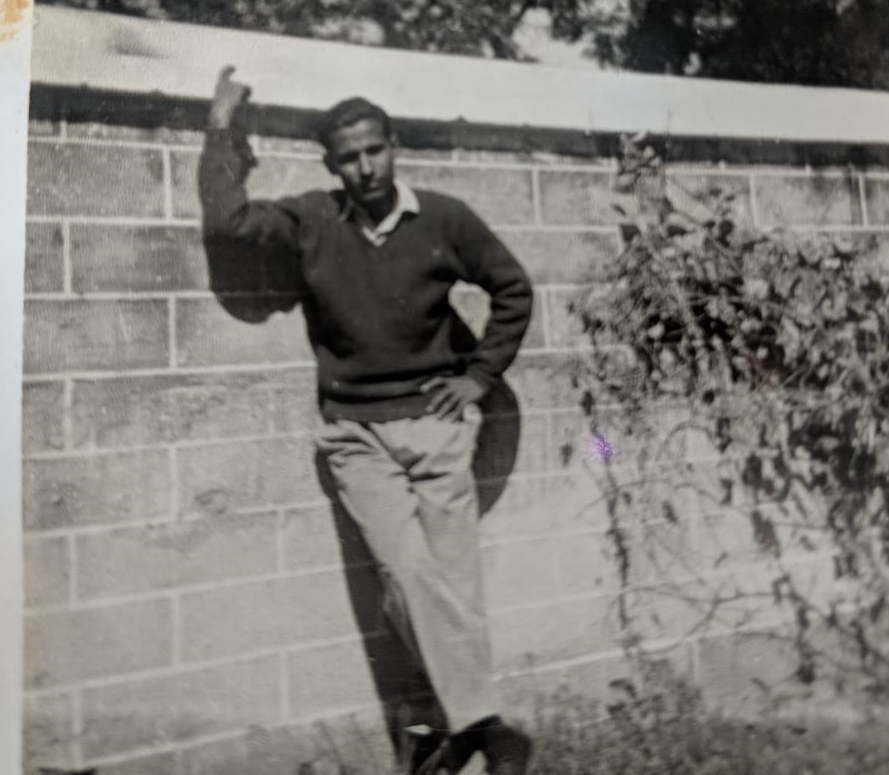As I remember from my school days in the fifties, our Sejokaka (সেজো কাকা, father’s younger brother), a grave man, had certain touch of aristocracy about him.
Shri Salil Kumar Mukherjee was one of the directors of Tripura Bank and posted at Patna. Always sporting spotless white ধুতি পাঞ্জাবি (Dhuti Panjabi) and highly polished “pumpshoes,” he was well dressed and stylish!
Come winter, an expensive shawl was always placed well on his left shoulder. Baba, our father, often referred to him as “Fulbabu”, out of appreciation! (someone with airs!)
In the first week of every month, after returning from the bank, he would be resting in বড় বাইরের ঘর (Baro Bairer Ghor, the big drawing room) and call for me. Lying on the table before him, there used to be stacks of shining new coins, neatly stacked in columns of ₹1 or 4 annas. Sejokaka would ask me to pick up any of the alluring silver coins, I would gladly oblige, picking up the most attractive ones and running away! I do not know if my other brothers were as lucky as me!
Those days one could buy 16 পান্তুয়া (“pantuas”, gulab jamoon) with a one rupee coin. The Indian currency continued to be strong long after independence. A rupee consisted of 16 annas. A lunch of delicious mutton and rice cost me only 6 annas in the year 1957 at Jharia. I remember having a plate full of “Luchi torkari” and sweets in only 4 annas at Ajmer in 1963! Oh those days!!
Memories of my Sejokaka are from my school days at Patna and later when he was posted at Sindri and I was studying at another kind of school again, the Indian School of Mines, at Dhanbad!
Out of his four brothers Kaka was closest to our father, he was not afraid of Baba as the others apparently were!
Sejokaka used to visit father in his work place in North Bihar. On such visits he observed Baba was cooking his own food and his living condition was not comfortable, in his quarters after the demise of our “Baro Ma”. From what I gathered from discussions amongst the seniors at home, out of concern for his oldest brother, Sejokaka reported the situation to our Chhoto Thakuma (ছোট ঠাকুমা) at Kolkata (Baro Ma’s aunt). There must have been serious discussions after which, father’s second marriage took place at Kolkata, arranged by Chhoto Thakuma (ছোট ঠাকুমা) and Choto Dadu (youngest granduncle, ছোট দাদু)!
Sejo Kaka had studied pure science ,which was a first in the Mukherji family, and was reportedly good in studies. ‘Pisima” our aunt used to proudly say, “ Motko ek bare pass dieche!” meaning Motko has passed his exam in first attempt! Thus shocking us into muffled laughter about the academic prowess of her other brothers! Pisima was very fond of her youngest brothers, Sejokaka and Chotokaka.
After joining a school as a teacher in Raghunathpur, he later joined the Fertilizer Corporation of India at Sindri.
He would come often to meet me at ISM, Dhanbad and hand me over ₹20. I used to wonder why he took the pains each month to come all the way, maybe he had instructions from Baba, to keep a watch on me, I thought!
Baba had also come to meet me thrice between 1957-61, to my hostel, all the way from Patna. He used to visit our “Sejo Mama” (maternal uncle) who was a manager at a colliery.
Sejda, my older brother, also sent me ₹20 every month, from Ranchi, plus I used to receive a scholarship from Govt of Bihar of ₹48 each month, so all this together summed up my finances then!

So enjoyed reading this and the first article too , Kaku.
Beautiful writing. In witty language. Brings the house itself to life. And places the perssons having lived in it to life also. One can visualise each and every corner of the house and so also the nature and personalities of three generations of Mukherjees who lived there.
Congratulations!!
Uncle – Enjoyed reading this as well. In my case, I am the eldest and my brother who is the youngest, was never scared of me. However, my two sisters were a bit scared of me. You are so lucky – you used to get money regularly from your uncle and brother. The joy of this is outstanding. I have experienced it only once as a student – My mousa sent 15 rupees by money order as my gift after I qualified for scholarship in grade-3.
Do you still have some of those silver coins?
Dear author,
The article was both engaging and enthralling to read. The greatest part is learning about a person’s impact on one’s life, which has been so enlightening that this article has been turned into a memoir.
Thank you so much for sharing your experiences with your thoughtful ecstasy.
Your autobiography makes very interesting reading. Those were the good old days,when life was very simple. Joint families was order of the Day with Dadu-didima, Kaka – kakima and others taking care of each other.
Thank you so much for your comments. Actually it is an autobiography of the house, where we used to live,if I may say, so !